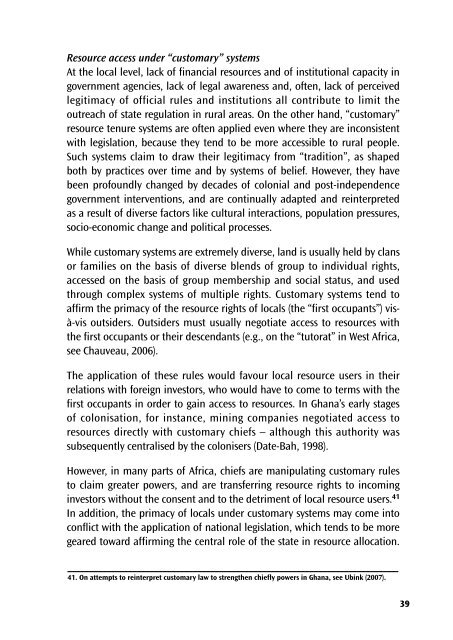Legal empowerment for local resource control
Legal empowerment for local resource control
Legal empowerment for local resource control
You also want an ePaper? Increase the reach of your titles
YUMPU automatically turns print PDFs into web optimized ePapers that Google loves.
Resource access under “customary” systems<br />
At the <strong>local</strong> level, lack of financial <strong>resource</strong>s and of institutional capacity in<br />
government agencies, lack of legal awareness and, often, lack of perceived<br />
legitimacy of official rules and institutions all contribute to limit the<br />
outreach of state regulation in rural areas. On the other hand, “customary”<br />
<strong>resource</strong> tenure systems are often applied even where they are inconsistent<br />
with legislation, because they tend to be more accessible to rural people.<br />
Such systems claim to draw their legitimacy from “tradition”, as shaped<br />
both by practices over time and by systems of belief. However, they have<br />
been profoundly changed by decades of colonial and post-independence<br />
government interventions, and are continually adapted and reinterpreted<br />
as a result of diverse factors like cultural interactions, population pressures,<br />
socio-economic change and political processes.<br />
While customary systems are extremely diverse, land is usually held by clans<br />
or families on the basis of diverse blends of group to individual rights,<br />
accessed on the basis of group membership and social status, and used<br />
through complex systems of multiple rights. Customary systems tend to<br />
affirm the primacy of the <strong>resource</strong> rights of <strong>local</strong>s (the “first occupants”) visà-vis<br />
outsiders. Outsiders must usually negotiate access to <strong>resource</strong>s with<br />
the first occupants or their descendants (e.g., on the “tutorat” in West Africa,<br />
see Chauveau, 2006).<br />
The application of these rules would favour <strong>local</strong> <strong>resource</strong> users in their<br />
relations with <strong>for</strong>eign investors, who would have to come to terms with the<br />
first occupants in order to gain access to <strong>resource</strong>s. In Ghana’s early stages<br />
of colonisation, <strong>for</strong> instance, mining companies negotiated access to<br />
<strong>resource</strong>s directly with customary chiefs – although this authority was<br />
subsequently centralised by the colonisers (Date-Bah, 1998).<br />
However, in many parts of Africa, chiefs are manipulating customary rules<br />
to claim greater powers, and are transferring <strong>resource</strong> rights to incoming<br />
investors without the consent and to the detriment of <strong>local</strong> <strong>resource</strong> users. 41<br />
In addition, the primacy of <strong>local</strong>s under customary systems may come into<br />
conflict with the application of national legislation, which tends to be more<br />
geared toward affirming the central role of the state in <strong>resource</strong> allocation.<br />
41. On attempts to reinterpret customary law to strengthen chiefly powers in Ghana, see Ubink (2007).<br />
39

















